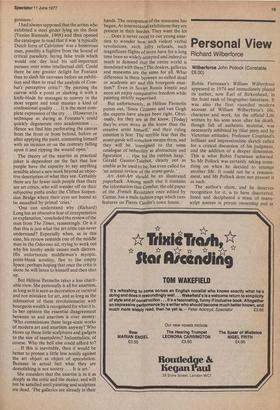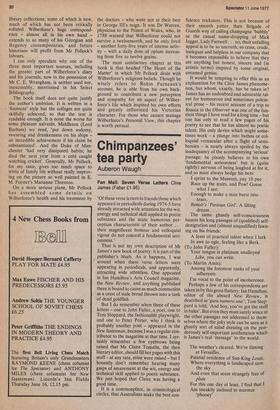Personal View
Richard Wilberforce
Wilberforce John Pollock (Constable £8.00) Robin Furneaux's William Wilberforce appeared in 1974 and immediately placed its author, now Earl of Birkenhead, in the front rank of biographer-historians. It was also the first rounded modern account of William Wilberforce's life, character and work, for the official Life written by his sons soon after his death, though full of authentic material, was necessarily inhibited by filial piety and by Victorian attitudes. Professor Coupland's brilliant and impressionistic sketch called for a critical discussion of his judgment, and the addition of a deeper dimension. This is what Robin Furneaux achieved. So Mr Pollock was certainly taking something on when he decided to attempt another life. It could not be a reassessment, and Mr Pollock does not present it as such.
The author's claim, and he deserves recognition for it, is to have discovered, listed and deciphered a mass of manuscript sources in private ownership and in library collections, some of which is new, much of which has not been critically collated. Wilberforce's huge correspondence — almost all in his own hand — extends to so many of his Georgian and Regency contemporaries, and future historians will profit from Mr Pollock's labours.
I can only speculate why one of the three most important sources, including the greater part of Wilberforce's diary and his journals, now in the possession of Mr C. E. Wrangham, is neither used nor, inexcusably, mentioned in his Select Bibliography.
The book itself does not quite justify the author's ambition. It is written in a 'footnote' style but the collages are quite skilfully achieved, so that the text is readable enough. It is none the worse for some pleasant naivetes. Middleton (Lord Barham) we read, 'put down sodomy, swearing and drunkenness on his ships — an incredible achievement if his claim be substantiated'. And the Duke of Manchester 'had very dissipated habits; he died the next year from a cold caught watching cricket'. Generally, Mr Pollock, for my taste, gives too much space to trivia of family life without really improving on the picture so well painted in E. M. Forster's Marianne Thornton.
On a more serious plane, Mr Pollock has assembled some details on Wilberforce's health and his treatment by the doctors — who were not at their best in George III's reign. It was Dr Warren, physician to the Prince of Wales, who, in 1788 warned that Wilberforce could not survive a twelvemonth, and he only lived — another forty-five years of intense activity — with a daily dose of opium increasing from five to twelve grains.
The most satisfactory chapter in this book is that headed The Heart of the Matter' in which Mr Pollock deals with Wilberforce's religious beliefs. Though he wisely refers to Robin Furneaux's account, he is able from his own background to contribute a new perception and sympathy for an aspect of Wilberforce's life which inspired his own efforts and greatly influenced his Victorian character. For those who cannot manage Wilberforce's Personal View, this chapter is worth perusal.



































 Previous page
Previous page